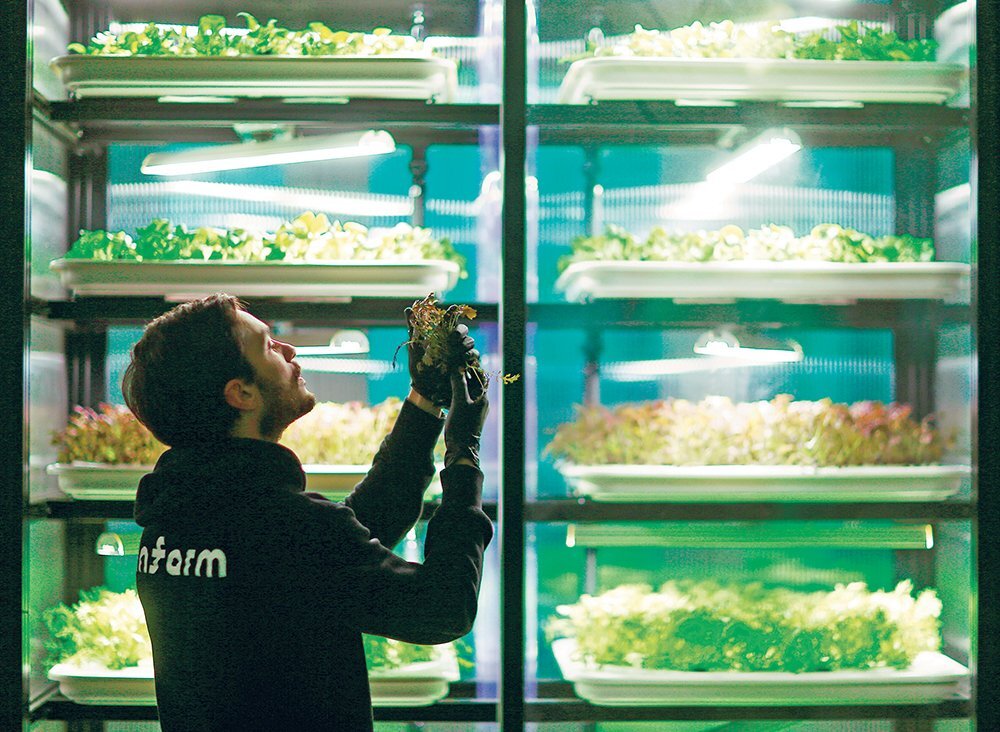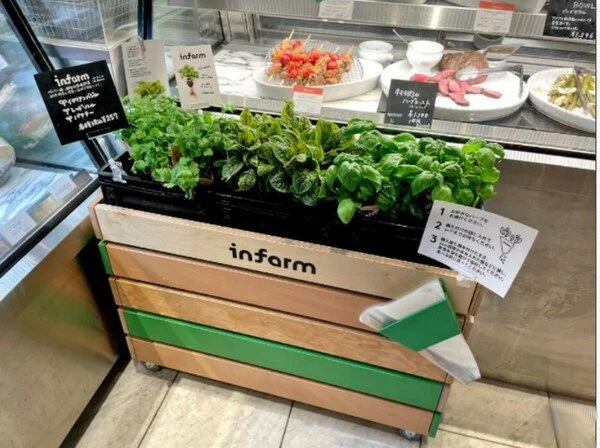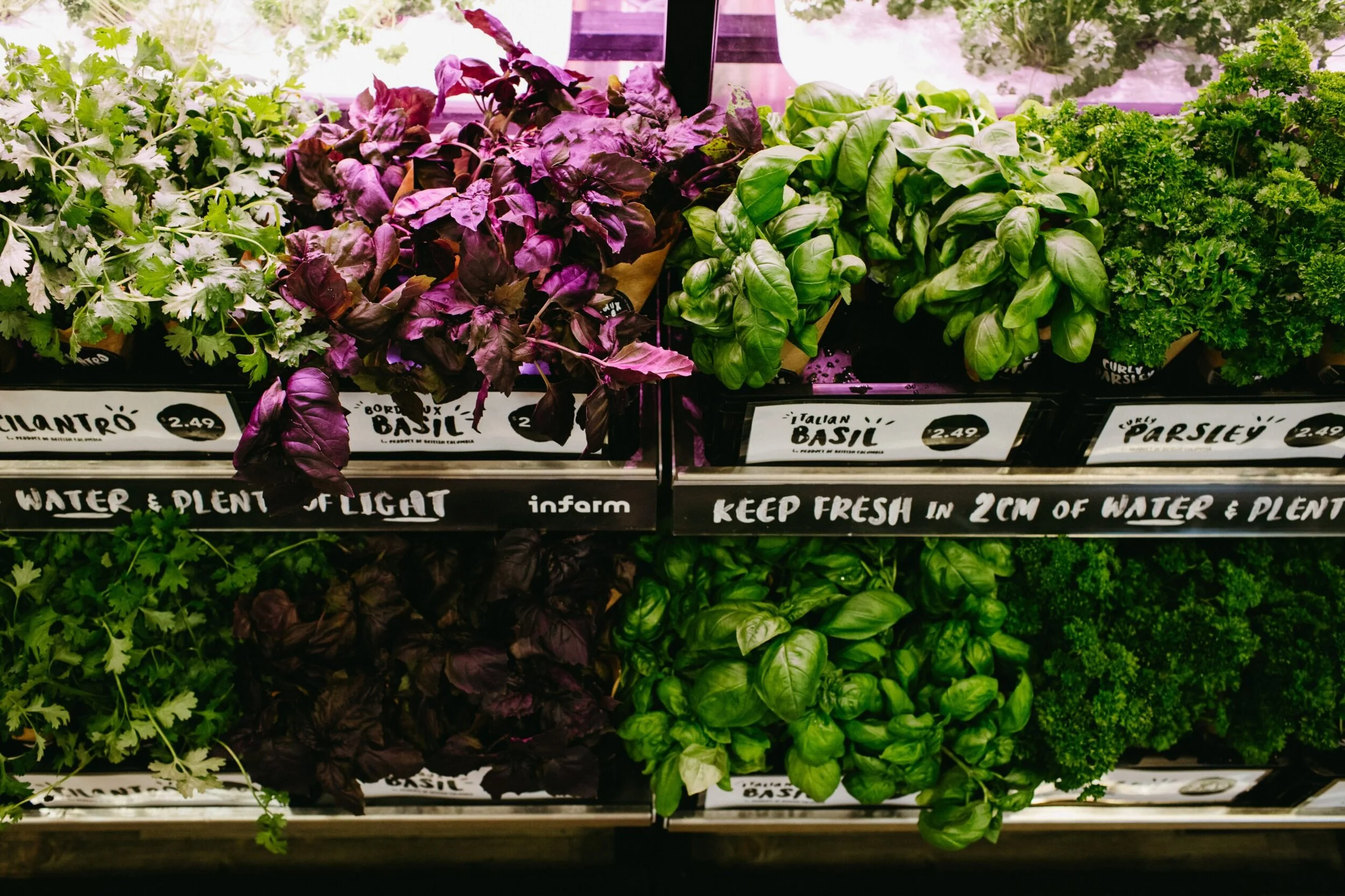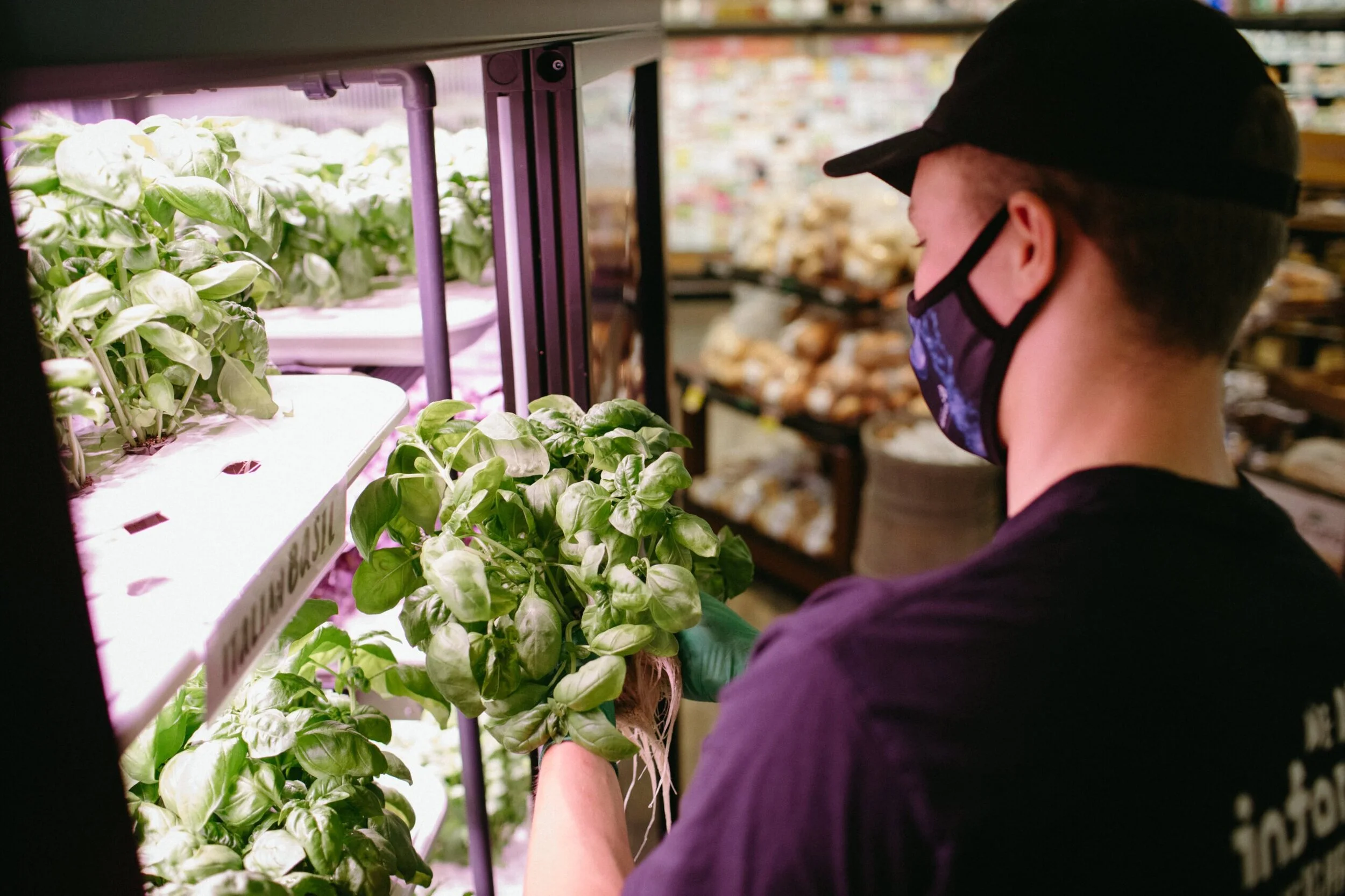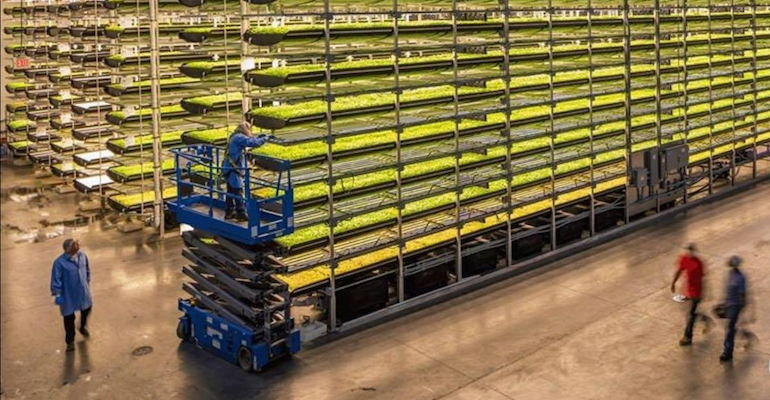
Welcome to iGrow News, Your Source for the World of Indoor Vertical Farming
Farm Merges With Food Retail Spaces
Canadians have started to notice that grocers have begun to sell plants in miniature greenhouses
By Sylvain Charlebois
July 29, 2021
Opinion
Canadians have started to notice that grocers have begun to sell plants in miniature greenhouses.
We’ve seen gardens on rooftops, vertical farms close to stores, and even some selling gardening equipment to gardeners who are shopping for food. The farm is essentially merging with food retail spaces.
We’re slowly witnessing the rise of the “grow-cer.”
For years, customers accepted the myth that food just magically shows up at the grocery store. But COVID-19 got many of us to think differently about supply chains.
With the addition of new farmgate features, grocery stores are becoming the gateway to a world most of us rarely see: farming.
Sobeys has provided one recent example of what’s going on. The second-largest grocer in Canada recently signed a partnership agreement with German-based Infarm to get greenhouses into many outlets across the country. Infarm units were installed last year in British Columbia and can now be found in many other locations across the country.
In-farm units enable Sobeys to offer fresh herbs and produce grown hydroponically, which requires 95 percent less water, 90 percent less transportation, and 75 percent less fertilizer than industrial agriculture. As well, no pesticides are used.
Produce grown inside the store includes leafy greens, lettuce, kale, and herbs such as basil, cilantro, mint, and parsley. Expansion plans include chili peppers, mushrooms, and tomatoes. The growing cycle for most of these averages five weeks.
It’s not just Sobeys. Other grocers also have decent-sized vertical farms inside their stores or nearby.
For many consumers, gardening remains a luxury due to the lack of space or time. But now grocers are bringing the farm to the store so consumers can have both the farming and the retail experience at once.
Before COVID, farmers desperately tried to get closer to city dwellers so their work could be appreciated. Campaigns over the years brought mixed results. Farming is still largely misunderstood.
City dwellers have always respected farmers and the hard work they do, but many consumers who were looking for natural and organically produced goods have grown leery of farming in general.
Grocers are starting to bridge the worlds of farmers and urban consumers.
For years, we saw pictures of farmers on packages and posters. It was nice, but it wasn’t real. The hard work, and everything else that comes with farming, can only be properly conveyed when visiting a farm or working on one for a while.
The pictures likely won’t disappear from grocery stores but they don’t really tell the whole story.
The new grow-cer brings the imagery of farming in retail to a new level. Grabbing a living plant or produce off a living plant is real and increasingly valuable for Canadians longing for local and freshness. It just can’t get more local than growing it in the grocery store.
COVID-19 eliminated many rules for grocers. Previously, every business played a part. Grocers sold food, processors manufactured it and restaurants provided ready-to-eat solutions. Lines between sectors were already becoming blurred before COVID, but the pandemic blew up the blurred lines.
Grocers are becoming brokers, connecting various functions of the supply chain. Farming connects with retail by way of new initiatives that we’re now seeing everywhere.
For example, restaurants are selling meal kits through grocers’ apps. Few saw that coming.
Food brokering for grocers is no doubt the next frontier of growth.
Whether it will last is unknown. But grocers are embracing the fact they have the privilege of interacting with consumers every day. That privilege comes with a responsibility to show consumers the true value of food by being knowledge brokers.
If that means growing more food in stores, so be it.
Dr. Sylvain Charlebois is senior director of the agri-food analytics lab and a professor in food distribution and policy at Dalhousie University.
Lead photo: An employee of the urban farming start-up Infarm checks an indoor growing system at the company’s showroom in Berlin, Germany. Sobeys is working with the German company to put greenhouses into its Canadian stores. | REUTERS/HANNIBAL HANSCHKE PHOTO
Biggest Energy Uses When Shopping In-Store Vs Online
Competition for the title of ‘most sustainable model’ has been hotting up as online shops and traditional bricks & mortar stores try to prove their worth to environmentally conscious consumers
By George Nott
4 June 202
A delivery fleet can produce 73% of an online-only grocer’s total emissions, and the energy consumption of physical stores constitutes 60% of emissions for a traditional retailer, but which is greener?
Competition for the title of ‘most sustainable model’ has been hotting up as online shops and traditional bricks & mortar stores try to prove their worth to environmentally conscious consumers.
Retailers in both spaces have been innovating to cut emissions, implement sustainable alternatives and switch to renewable energy sources without compromising the customer experience.
Here, we compare the biggest emitters of each model.
Energy use in the store model
Lighting
A 2018 study by UCL and Brunel University found UK supermarkets had “significantly improved” and reduced energy intensity in recent years. Reductions of up to 32% have been won in lighting, much of it through the use of LED lights. Iceland ploughed £8m into sales floor LED lighting in 2015, which has delivered a 50% cut in its lighting-related emissions. More recently, it has installed automatic light controls so only half are used when stores are closed to the public and none when security alarms are activated.
Refrigeration
Supermarkets use vast amount of energy on keeping everything chilled. But that energy use is falling, thanks to the advent of new technology. A 2018 analysis of 565 supermarket stores from one retailer in the UK found the amount of energy used by refrigeration had fallen by as much as 20% in the five years to 2017. Simple solutions work. M&S is using ‘aerofoils’ on open-fronted fridges, which guide cold air down more efficiently, thereby using potentially 30% less energy.
HVAC
To keep customers comfortable, supermarkets typically maintain an in-store temperature of between 18°C and 24°C. Air-con systems have to work against bakery ovens, open chillers, customer body heat, opening entry doors, and the weather. Improvements are harder fought, with energy usage by supermarket HVAC systems falling only 8% in recent years. Tesco is using AI to fine-tune its systems. “This will optimize our heating and air conditioning through predictive algorithms,” the supermarket says.
Energy used by refrigeration fell by about 20% in the five years to 2017
Customer vehicles
Close to a third of offline retail’s carbon emissions are a result of customers individually driving from their homes to shops. The impact is more than double that of delivery vans, which make multiple deliveries, fulfilling the same amount of shopping. There are significant variables – like distance travelled. If they take public transport, walk or cycle, the emissions drop. But carrying a full basket is hardly desirable. Promisingly, Oliver Wyman predicts vehicle emissions will fall 30% by 2030.
Alternative energy
Many supermarkets are prioritizing renewable energy sources. Some have gone all out on solar energy, in particular. Aldi has around 100,000 solar panels across 400 of its UK stores and all 11 distribution centres. On average, panels power around 10% of a store’s electricity consumption each year, the discounter says. Meanwhile, M&S boasts one of the UK’s largest panel arrays at its Castle Donington DC, while Tesco recently signed a deal for 15,000 solar panels to be installed on 17 of its stores.
Energy use in the online model
Delivery vans
Vehicle emissions are responsible for the most emissions in online operations. In Ocado’s case, its fleet produces 73% of the company’s total emissions (followed by electricity at 20%).
Ocado’s proposed new Islington depot will use electric vans for customer deliveries as it works towards “operating the largest fleet of electric vans of any grocery retailer in the UK”. Restocking the site will be done using only natural gas-powered LGVs, which are up to 65% lower in emissions than diesel LGVs.
Route optimizing
The rise of online grocery has led to efficiencies thanks to the density of drop-offs that can be made by a single van. “The innovation that needs to happen, but won’t,” says Andy Needham, MD of online surplus retailer Approved Food, “is that supermarkets amalgamate deliveries so there is just one van visiting a street at any one time, instead of the current procession of an Asda van at one house, Sainsbury’s two doors down at the same time and then Tesco turning up 20 minutes later.”
’Over-packaging’ of online orders represents 23% of total parcel weight in fashion
Packaging
Oliver Wyman found “over-packaging” of online orders represents 23% of total parcel weight in fashion, 10% in books, and 18% in consumer electronics. For online grocery, above product-level packaging is minimal. While the analysis considered the impact of carrier bags “marginal”, online grocers have been confronting the problem. In April, Tesco removed the option for plastic bags and tray liners online. Meanwhile, Ocado operates a buy-back and recycling scheme for plastic carrier bags.
IT systems
The automated picking and packing systems used by online pure-players comes at a considerable energy cost. According to Oliver Wyman, IT energy consumption amounts to 178g of CO2 equivalent emissions per product for e-commerce, totaling around a fifth of total emissions. Here physical retail – despite all the checkouts, scanners, and control systems used in the space – is undoubtedly less impactful. In stores, IT emissions stand at 115g per product or 35% less than online.
CFCs
While huge grocery CFCs or ‘dark stores’ use less energy than stores, there are still improvements to be made. Major operators are joining the supermarkets in pursuing net-zero carbon targets. Logistics company Wincanton – which operates a CFC on behalf of Waitrose – this month launched a new environmental strategy that “will achieve its target to be net zero by 2040 across transport, property and waste”. Under its plans, home deliveries will be net-zero carbon throughout its network by April 2022.
Tags: Carbon Emissions Online Packaging Store design Supermarkets Sustainability & environment
Vertically Produced Veggies Sold In Japanese Supermarket
Infarm's systems found in supermarket chains
On May 28, Dean & Deluca Hiroo, a food shop in Hiroo started to sell vegetables grown in an indoor vertical farm.
Infarm introduced the system was introduced to three Kinokuniya shops and two Summit shops in January this year. Dean & Deluca is the first supermarket in Japan to carry the product.
The vegetables are Italian basil, pak choi, red sorrel, and wasabi arugula (257 yen each). They are sold with their roots still attached. Dean & Deluca will replace some of its deli vegetables with those grown on the farm. These include the Lebanese potato salad (562 yen), the pak choi shrimp (702 yen), and the spiced potato salad and hummus sandwich (691 yen). Basil is used in the "Avocado gratin with prawns (shrimp) and basil" (594 yen) and "Edamame hummus" (454 yen, 100 grams each).
This is the first time that a vegetable-based dish has been sold at Kinokuniya and other stores. In Germany and other countries, vegetables harvested in the shop are sometimes used directly for cooking. Now, the company is aiming to introduce the product to restaurants in Japan as well.
Read the complete article (in Japanese) at www.news.yahoo.co.
1 June 2021
GERMANY: New 'Supermarket of The Future' Has A Greenhouse On Top
It is the first supermarket with a rooftop greenhouse in Europe and it combines retail with a basil farm and fish farm
What will the shopping centre of the future look like? How do you build sustainably? According to REWE, it is one with a greenhouse on top. Last Friday, the German retail giant opened their first Green Farming pilot store in Wiesbaden-Erbenheim. It is the first supermarket with a rooftop greenhouse in Europe and it combines retail with a basil farm and fish farm. "Since 2009, we have already built over 200 Green Buildings in Germany. The new store with integrated rooftop farm is the logical next step for us," says Peter Maly, Divisional Director REWE Group and responsible for REWE stores in Germany.
Supermarket and production facility
"The Green Farming store is not just a supermarket, but also a production facility in the middle of the city. On the rooftop farm, which is operated by our partner ECF Farmsystems, 800,000 basil plants grow each year using aquaponics, which receive excrement from the fish that we breed on site as fertilizer. No pesticides are used in the process," shows Jürgen Scheider, Chairman of the Management Board REWE Region Mitte. Rewe is Germany's second-largest supermarket chain.
"Our vision is to provide people with sustainably produced food. That's why I'm pleased to be able to help realize the dream of a self-producing supermarket here in Wiesbaden," adds Nicolas Leschke, founder and managing director of ECF Farmsystems. The company created a technique to couple aquaculture fish production with the hydroponic production of leafy greens. "Perch and basil are part of two resource saving cycles. The fish fertilize the basil plants with their excreta. These in turn clean the water from the fish tanks, which can then flow back to the perches. The use of this cycle system enables food production with 90 percent less water consumption compared to conventional agriculture, as the water is used twice."
Basil supplied locally
The basil is already available at the opening and will also be delivered to 480 REWE stores in Hesse and parts of Rhineland-Palatinate. Around 14,000 pots of basil are packaged plastic-free on site every week and according to the REWE team, the sustainable packaging saves 12 tonnes of plastic per year.
At the same time, about 20,000 cichlids are bred in basins on about 230 square metres under sustainable conditions and processed on site. This produces about one tonne of fish meat per month. The fish is expected to be on sale by the end of 2021.
ECF Farmsystems uses LED lamps for their herb cultivation, supplied by Fluence. They've gained experience with these lamps in their urban farm ECF Farm Berlin, which they constructed earlier and currently operate and of which the products are also sold to Rewe. Their other projects include planning and construction of the rooftop farm ecco JÄGER in Bad Ragaz in Switzerland and the rooftop farm on the Ferme Abattoir in Belgium.
Construction and operating
"With Green Farming in Erbenheim, we are ushering in a new generation of green stores at REWE," says Peter Maly with REWE, adding that holistic sustainability not only includes product ranges but also construction and operation.
Wood is the core element of the supermarket: around 1,100 cubic metres of the renewable raw material were used here. "The indigenous coniferous wood stores more than 700 tonnes of CO2. In 30 years, the wood will have grown again and the CO2 balance will be balanced." Columns made of stacked wood form the supporting structure for the glass roof farm and form a vaulted structure that extends into the store. Inside, customers look out onto a glass atrium, the greenhouse on the roof. "A natural marketplace ambience with lots of daylight was created," Peter reveals.
A lot of daylight can be used through the glazed east and west facades and the atrium. In addition, intelligent cooling and heating technology, 100 per cent green electricity and the use of rainwater for the roof farm, sanitary facilities and cleaning of the store ensure that resources are conserved.
Also the assortment focuses entirely on freshness with a large fruit and vegetable section including a salad bar, many regional and organic products as well as a glass butchery with a show kitchen and meat from animal welfare farms. In front of the store, local suppliers can offer their products in specially produced market stalls.
"The new REWE store in Erbenheim is a milestone in the development of modern supermarkets. I am very pleased and also a little proud that this special project has been realized in our region," says Jürgen Scheider, Chairman of the Management Board of REWE Region Mitte. "We are particularly proud of the wide range of products from over 100 regional and local suppliers."
Publication date: Fri 4 Jun 2021
Author: Arlette Sijmonsma
© VerticalFarmDaily.com
Brick Street Farms Expands Through Florida and East Coast
“We really wanted to bring food production to the point of consumption, so we’re focused on embedding our farms in urban areas,” says Shannon O’Malley, CEO, and co-founder of Florida-based container farming company, Brick Street Farms
"We Are As Much A
Technology Company
As We Are A Farm Operator”
“We really wanted to bring food production to the point of consumption, so we’re focused on embedding our farms in urban areas,” says Shannon O’Malley, CEO, and co-founder of Florida-based container farming company, Brick Street Farms.
The company was founded by Shannon and her husband Bradley, who combined her expertise in electrical engineering with his background in software development to design their own shipping container farms.
According to Shannon, a major differentiator of Brick Streets Farms is that the company manufactures and operates its own shipping container farms.
Brick Street Farms Hubs
Brick Street Farms has recently secured a significant investment from Lykes Brothers, which is reportedly one of the largest and longest-running private agricultural companies in the United States. During the official announcement last week, the financial investment will be used to aggressively expand Brick Street Farms hubs, which are the combination of container farms with a retail front in densely populated areas.
Click here to Zoom the photo. (Photo courtesy of Brick Street Farms)
According to Shannon, this expansion will begin in west-central Florida then expand to the east coast. From these hubs, Brick Street Farms will also introduce home delivery and will support restaurant partners located within 50-100 miles of the hubs. Already in 272 Publix supermarkets, Brick Street Farms will continue this partnership and plans to expand into additional product categories.
Building a resilient, multi-channel sales strategy
Brick Street Farms was first developed in 2015, and during its early years, the company predominantly sold its products to restaurants and directly to customers. However, the pandemic-induced shutdown in 2020 resulted in the loss of 70% of Brick Street Farms’ clients due to restaurant closures. As Shannon explains, Brick Street Farms was already selling its products in the GreenWise section at Publix supermarkets, which is reportedly the largest employee-owned supermarket chain in the US. This partnership allowed Brick Street Farms to quickly pivot following the mandated closure of restaurants.
“In the same month that Florida went into lockdown, grocery stores saw an incredible jump in demand so we were able to quickly pivot and provide our vegetables to grocery stores within a week. We are currently in 272 Publix stores and are working to expand into west-central Florida,” says Shannon. The state of Florida has since reopened and Brick Street Farms was able to bring back its previous accounts and sign new ones, according to Shannon.
Brick Street Farms also has its own gourmet market located at the farm that is open six days per week. Consumers can shop either on-site or online, with contactless delivery available. Shannon also explains that the company has adopted a unique twist to community-supported agriculture. By subscribing to a farm membership, consumers receive a discount and support the recently approved non-profit, Desert Farms Foundation.
“We established Desert Farms Foundation to help us bring container farms to food deserts within the United States. With a farm membership, 1% of the proceeds go to Desert Farms Foundation to really support community agriculture,” explains Shannon.
Thrive Containers
“Our containers are under the name Thrive Containers, which is wholly owned by Brick Street Farms. Our containers are the equivalent of 2-3 acres of traditional farmland. They use very little water, are energetically efficient, produce very little waste and use no chemicals. Since our products are wash-free, our customers get the benefits of long-lasting produce,” explains Shannon.
According to Shannon, Brick Street Farms is as much an agtech company as it is a farm operator. The company decided to establish Thrive Containers as its own entity within Brick Street Farms in order to differentiate between the food production and manufacturing aspect of the company. “When people see Brick Street Farms, we want them to think of butterhead lettuce, basil and our other vegetables,” notes Shannon.
Thrive Containers does not sell its container farms to third parties, but instead continuously improves the farm design for current and future installations. As Shannon explains, the company focuses on designing intelligent systems that can adjust to indoor and outdoor environmental conditions. Thrive containers have more than 120 sensors in and around the farm to monitor and respond to ambient temperature, humidity, carbon dioxide, vapor pressure deficit, etc.
Brick Street Farms and Thrive Containers work closely, with the engineers and designers having all undergone farmer training to ensure that the systems designed truly respond to the needs of Brick Street Farms’ growers.
Why Florida?
While warm and sunny Florida may seem ideal for outdoor agriculture, Shannon explains that soil conditions make soil-based agriculture somewhat difficult. She says that Florida soils are rather degraded and sandy, lack nutrients and lack natural bacteria, meaning farmers need to spend significant time and effort on rebuilding soils. Also, water sources are highly saline because of our position at level, near the coast, and with a low water table. Finally, the lack of winter makes it difficult to regulate pest cycles.
Lead photo: Co-founders Brad Doyle and Shannon O’Malley
For more information:
Madeline McNaughton, Head of Business Development
Brick Street Farms
madeline@brickstreetfarms.com
www.brickstreetfarms.com
Publication date: Thu 27 May 2021
Author: Rebekka Boekhout
© VerticalFarmDaily.com
Sobeys Expanding In-Store Vertical Farms Across Canada
Grocery store chain Sobeys is expanding its unique Infarm vertical farming units to more stores across the country as it takes advantage of the growing consumer appetite for made local products
May 2, 2021
Grocery store chain Sobeys is expanding its unique Infarm vertical farming units to more stores across the country as it takes advantage of the growing consumer appetite for made local products.
Niluka Kottegoda, Vice President Customer Experience, Sobeys, said Infarm is a vertical farming company based out of Germany.
Niluka Kottegoda
“We searched far and wide to find a really great best-in-the-world, unique, innovative solution for our customers as we were looking for a vertical farming solution,” she said.
“Infarm provided us with an opportunity to get farms into our stores, with end-to-end service. So they made it very easy for our stores and most importantly our customers’ best experience when it came to vertical farming globally. Each unit that you’ll see in the stores is a farm unto itself. The plants grow right in that module and they control all of the nutrients, the amount of water, the amount of food our plants get, and the amount of light that they get from a central farming platform.
“Just before COVID hit, I had the opportunity to go and see their office. And it’s really very special. On a screen, you can see every farm that they have around the world. They know exactly the condition of that plant and what it needs and if there’s a problem they can quality control. It’s all managed through the cloud and each one of the farmers has a tablet and information is passed on to the units and the farmers through their central platform.”
Local farmers manage the vertical farming at the individual grocery stores, where a variety of herbs, microgreens, leafy greens, and lettuces are grown year-round. Produce is grown directly in-store in a controlled energy-friendly environment and harvested sustainably.
Sobeys first unveiled its partnership with Infarm in 2020 and began its national rollout by unveiling Infarm vertical farming units in Safeway and Thrifty Foods stores in Vancouver and Victoria, B.C.
Kottegoda said generally there are two units per store but in larger stores, more units can be added.
“Right now we have them across Vancouver and Victoria. We have one installed in Halifax with 25 more coming. We have two installed in Calgary with 22 more coming. And one installed in Edmonton with 18 more coming,” she said.
“Once these latest ones are installed we’ll be closing in on 100 stores across the country. At the moment, we’re probably about 55 percent of the way there. We’re expanding across seven cities in the country.”
Kottegoda said the company does an assessment of all of its stores across the country to see whether it’s viable to put a farm into certain locations.
“The reason we’re going city by city is to make sure that we have the farmers ready. You just can’t put a unit in the store and hope for the best. You have tons of farmers there to support it. We have to make sure the local infrastructure is there and then we can expand across the country which is why you see us going city by city,” she added.
The company said these crops are harvested using 95 percent less water, 90 percent less transportation, and 75 percent less fertilizer than industrial agriculture.
“One of the great appeals of them is you can get fresh herbs, and leafy greens, all year round even through the winters as fresh as possible in our stores,” said Kottegoda.
“We can change up the assortment every five weeks. So the five-week cycle is from when our herbs and leafy greens and plants grow from seedlings until they’re ready to harvest. We can switch up the assortment anytime we need to. We can be really relevant to all of our local customers which is pretty exciting.”
She said locally-grown products are very important for consumers these days and the company has seen the importance of partnering with local producers in its stores.
“It’s also about the freshness and the taste experience. All of our customers are always looking for the best in terms of food and we pride ourselves in being able to give that to them. This is the freshest possible product, locally grown all year long,” added Kottegoda.
“And it’s been an interesting journey because we have been expanding during the pandemic and we have seen incredible trends in terms of at-home cooking, getting more and more popular. Going along with that people are getting more adventurous with the ingredients that they use, and the different herbs that they use.”
Lead photo: Exterior of Sobeys grocery store. Photo: Supermarket News
Article Author
Mario Toneguzzi, based in Calgary, has more than 40 years experience as a daily newspaper writer, columnist, and editor. He worked for 35 years at the Calgary Herald covering sports, crime, politics, health, faith, city and breaking news, and business. He now works on his own as a freelance writer and consultant in communications and media relations/training.
Square Roots Expands Premium Herbs Range With Fresh And Aromatic Cilantro, Dill, And Parsley Grown In Climate Controlled Local Farms Across The Country
Indoor farming company takes the next step in bringing local, real food to cities using modular farm technology that empowers both farmers and consumers
Indoor farming company takes the next step in bringing local, real food to cities using modular farm technology that empowers both farmers and consumers
May 17, 2021 (New York, NY) — Square Roots, the technology leader in urban indoor farming, is expanding its herb range by introducing three premium fresh offerings - Cilantro, Dill, and Parsley - to complement its widely successful signature Basil. Co-founded by Kimbal Musk, Square Roots’ herbs are grown across the company’s network of cloud-connected and climate-controlled indoor farms in New York and Michigan and are now available in more than 200 retail stores - including Whole Foods Market, Fresh Thyme Market, SpartanNash, and FreshDirect.
“COVID-19 has accelerated the adoption of locally grown indoor produce”, said Raji Margolin, EVP of Sales and Marketing at Square Roots. “The habits of at-home cooking and using fresh, local produce are here to stay. Now more than ever, people care about the food they eat, and where it's grown - and our goal is to make sure that fresh and local food is available to consumers year-round. These herbs are just the beginning of our product offerings and we can’t wait to expand into additional categories.”
Square Roots has a strategic partnership with Gordon Food Service (GFS), one of the country’s leading food service providers, to deploy farms across the country together and provide fresh, high-quality, local food to consumers across cities, year-round. Square Roots broke ground on its latest indoor farm in Grand Rapids, Michigan in December 2020 and began planting seeds just three months later, in March 2021. This rapid deployment capability is enabled by the company’s modular farm-tech platform.
“We’re using technology a little differently at Square Roots farms”, said Tobias https://www.igrow.news/igrownews/indoor-ag-science-cafe-may-18th, Co-Founder, and CEO at Square Roots. “Food, farmers, and consumers are all connected at the center of our system. We surround our farmers with data, tools, and insights to help them grow more, better-tasting food with fewer resources. At the same time, with features like our unique Transparency Timeline, we help our consumers understand exactly where their food comes from and who grew it.”
The expanded herb range is available in both the New York City area and the Great Lakes Region.
About Square Roots
Square Roots is the technology leader in urban indoor farming. Its mission is to bring local, fresh, real food to people in cities around the world - setting new standards for transparency and responsibility while empowering the next generation of leaders in agriculture. Founded by serial entrepreneurs, Kimbal Musk and Tobias Peggs, its range of fresh produce is available in more than 200 retail locations around the country including Whole Foods Market, Fresh Thyme Market, SpartanNash, and FreshDirect. Square Roots’ strategic partnership with Gordon Food Service reinforces a larger shared ambition to build commercial scale, climate-controlled indoor farms together across the continent - enabling local food at a global scale, year-round.
For more information, please visit www.squarerootsgrow.com.
Whole Foods, Amazon Fresh, FreshDirect Step Up Distribution From AeroFarms
Newark, N.J.-based AeroFarms said Thursday that it plans to double its product offering at Whole Foods and, for Amazon Fresh, has expanded from one to five distribution centers, increasing availability throughout the New York metropolitan area
Indoor Vertical Farmer Pilots Leafy
Green Offerings With Walmart in Mid-Atlantic
May 13, 2021
AeroFarms grows all of its leafy greens in New Jersey at one of its commercial indoor vertical farms.
Whole Foods Market, Amazon Fresh, and FreshDirect will be receiving a bigger distribution of leafy greens from indoor vertical farmer AeroFarms, which also has introduced its products at Walmart.
Newark, N.J.-based AeroFarms said Thursday that it plans to double its product offering at Whole Foods and, for Amazon Fresh, has expanded from one to five distribution centers, increasing availability throughout the New York metropolitan area. Both Whole Foods and Amazon Fresh are part of Amazon.com Inc.
Related: Albertsons adds Bowery vertically farmed produce
AeroFarms said its leafy green products are ready-to-eat and don’t require washing.
Related: Kroger brings 80 Acres Farms vertically farmed produce to more stores
Meanwhile, AeroFarms greens have become available for same-day delivery through online grocer FreshDirect’s Express service, following an expansion from one to three distribution centers. And in the Mid-Atlantic region, AeroFarms said it’s piloting its products at selected Walmart stores in Virginia. The Walmart distribution comes after AeroFarm’s ground-breaking last month for a 136,000-square-foot vertical farm in Danville, Va., which the company said will be the world’s largest indoor aeroponic indoor vertical farm when it goes into operation in mid-2022.
In addition, AeroFarms said it has teamed up with Bronx, N.Y.-based fresh produce specialty foods wholesaler Baldor Specialty Foods on retail and foodservice distribution in the Northeast. The vertical farmer also partners with ShopRite in the region.
“Our company is committed to our long-term retail partners, and we are excited to expand our distribution and penetration with them,” David Rosenberg, co-founder and CEO of AeroFarms, said in a statement. “Our leafy greens are consistently praised for their quality, texture and flavor, and our customers connect with our brand because of our authentic and transparent approach to sustainable farming. We’re looking forward to giving our customers more choice and flavor options as we continue to scale the business and broaden our reach.”
A a Certified B Corporation, AeroFarms grows its leafy greens using proprietary aeroponics and indoor vertical-farming technology. The company said its model yields annual productivity up to 390 times greater than traditional field farming and uses up to 95% less water and zero pesticides, in turn providing optimal quality, color, nutrition, texture and taste for its produce.
AeroFarms noted that all of its leafy greens are grown indoors in New Jersey at one of its commercial indoor vertical farms, which are certified for USDA Good Agricultural Practices, SQF Level 2 Good Manufacturing Practices, Non-GMO Project Verification and OU Kosher. The company said its 10 leafy green products — including micro arugula, broccoli, kale, rainbow mix, spicy mix, and super mix plus baby arugula, bok choy, kale and watercress — are ready-to-eat and don’t require washing, providing more safety and convenience to customers. Earlier this month, the vertical farmer announced a rebranding of its Dream Greens retail brand to the AeroFarms label.
Several large U.S. grocery retailers have announced expanded vertically farmed produce offerings at stores this year, including Albertsons Cos. with Bowery Farming in the Northeast and Mid-Atlantic; The Kroger Co. with 80 Acres Farms in Ohio, Indiana and Kentucky; and Giant Eagle with Fifth Season in Pennsylvania and Ohio.
TAGS: SUSTAINABILITY


